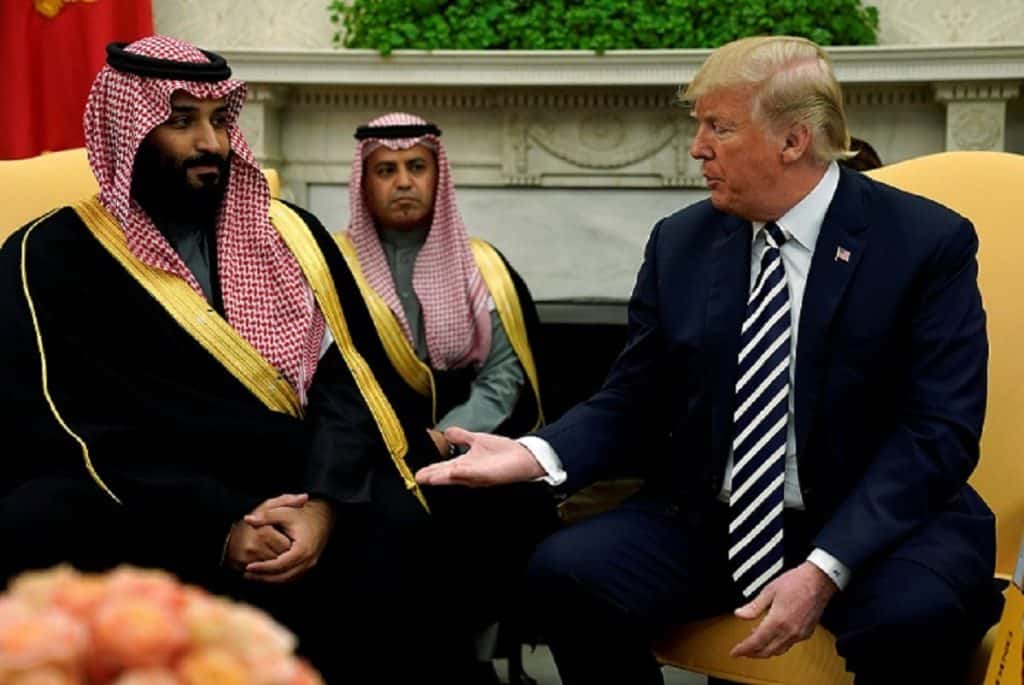By Denis Korkodinov
Relations between Washington and Riyadh have noticeably cooled as a result of the withdrawal of a significant part of American troops from Syria. Meanwhile, more recently, when Donald Trump refused a nuclear agreement with Iran, the United States and Saudi Arabia were reliable partners.
The constructive dialogue between the White House administration and the Kingdom was based primarily on security and economic issues. The culmination of cooperation occurred in the 1980-1990s, when countries were looking for each other support for their political regimes. However, over time, Riyadh began to lose interest in Washington, which quite often contradicted Saudi politics.
In particular, due to the inability of the Bill Clinton administration to act as a guarantor of peace in the Arab-Israeli confrontation, the Saudis were extremely dissatisfied. Among other things, after the attacks of September 11, 2001, the anti-Arab information campaign was actively developed in the United States, in which Saudi Arabia, along with other states, was accused of supporting international terrorism. This further worried Riyadh, which led to a sharp reduction in the opportunities for continuing a constructive dialogue with former partners.
The coup d’etat in Egypt that brought Abdul-Fattah al-Sisi to power was another reason for the growing tension between the Saudis and the White House administration. So, Riyadh proceeded from the opinion that the United States would support the Egyptian branch of the Muslim Brotherhood and Muhammad Mursi. However, the victory of Al-Sisi’s supporters forced the Saudis to feel threatened, citing the possibility that, if necessary, Washington could contribute to the overthrow of the royal dynasty in Saudi Arabia.
If it were not for the US refusing a nuclear deal with Iran, relations between the White House administration and the Saudi royal court would continue to be in a negative state. However, Riyadh has been criticizing Tehran for a relatively long time for supporting armed groups in Lebanon, Yemen, and Syria. In addition, the Iranian ballistic missile program creates cause for concern not only in the kingdom, but in all countries of the Persian Gulf.
In this regard, the confrontation between Donald Trump and the Ayatollah regime was met with great enthusiasm by Saudi Arabia. This allowed the KSA Crown Prince Mohammed bin Salman to claim significant arms shipments from the United States on the personal initiative of Donald Trump, bypassing the decision of the US Congress. In turn, through weapons supplied from the United States, Riyadh was able to achieve military success in Yemen and Syria for a short period of time, which slightly improved the image of the crown prince in the international arena.
Nevertheless, the withdrawal of American troops from Syria on the eve of the Turkish operation “Source of Peace” had a bad effect on the positions of the Saudi monarchy, since the country, like the Syrian Kurds, formally protected by the United States, felt vulnerable if the Americans renounce to their obligations to ensure the security of the Gulf countries. This raised the question of the futility of further close cooperation between Crown Prince Mohammed bin Salman and Donald Trump, who, according to international analysts, did not justify the trust of his allies.
In the end, the withdrawal of American troops from Syria occurred against the backdrop of the Iran-US confrontation, when the Ayatollah regime sought to intensify its cooperation with Bashar al-Assad. However, Washington, refusing to defend the Kurds, in fact granted Tehran, the long-standing enemy of the Saudis, the right to freely spread its influence in the Syrian theater of operations, rapidly displacing Riyadh from it. This state of affairs, of course, does not meet the interests of the monarchy, which is forced to jeopardize the armed groups affiliated to it operating on the territory of the UAR.
Be that as it may, the withdrawal of American troops significantly changed the existing alignment of forces in the region, as a result of which Saudi Arabia and other countries lost the opportunity to influence the events.
(The opinions expressed in this article are solely those of the author and do not necessarily reflect the views of World Geostrategic Insights)
Image Credit: Reuters/Ernst/File Photo







